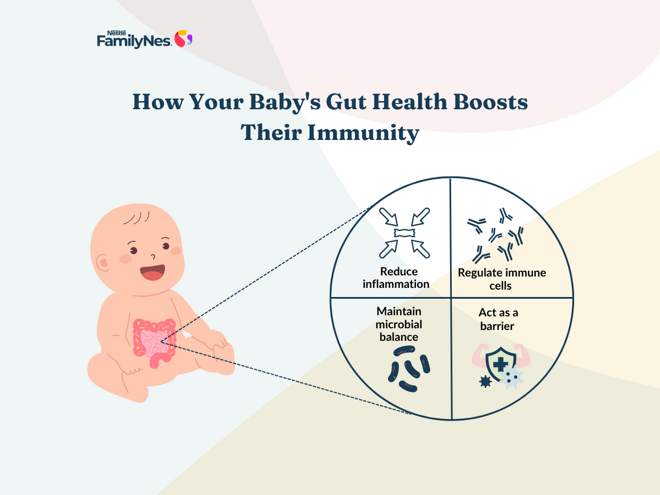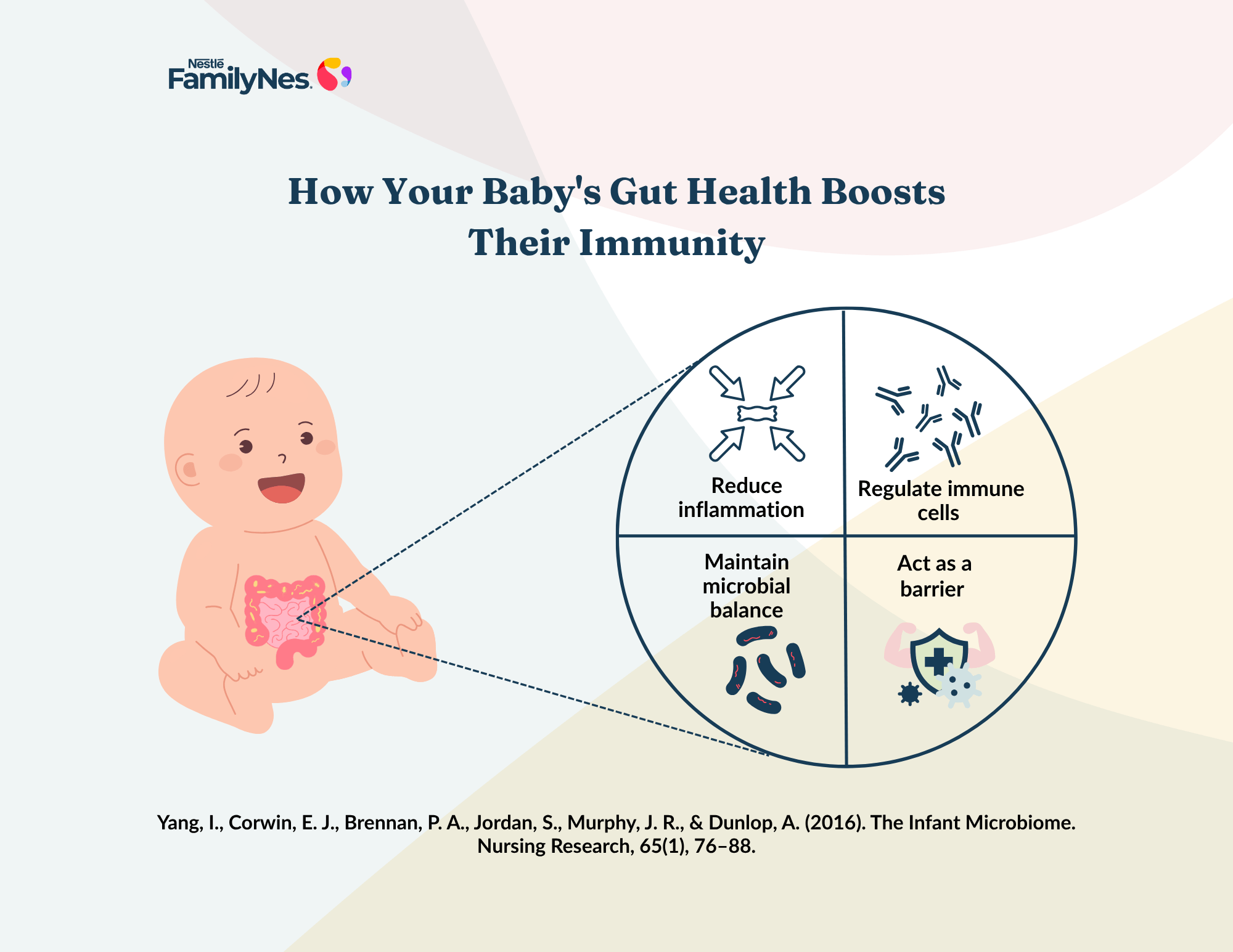
Understanding Your Baby's Gut Health and Its Impact on Immunity
Your baby's health is your first concern as a parent, and gut health is one of the most important but sometimes disregarded factors. The human gut microbiome plays a vital role in health, developing alongside the immune system after birth. 70-80% of immune cells are present in the gut, making it an important component in immunomodulation.
Why Is Gut Health Important for Babies?
The gut is home to trillions of both beneficial and harmful bacteria, collectively known as the gut microbiome1. These beneficial and harmful bacteria, when they exist in balance, keep the body healthy.
This microbiome begins to develop since birth and is influenced by many factors: type of deliver- caesarean or vaginal; type of feed: breastmilk or formula; post 6 months- introduction of solids and transition to family food and also the environmental factors.
How Gut Health Affects Immunity
A significant portion, 70-80% of the immune cells, resides in the gut, making the function of the immune system linked to your baby’s ability to fight infections.
• Barrier Function:
The gut lining acts as a physical and immunological barrier, preventing harmful bacteria and toxins from entering the bloodstream2.
• Microbial Balance:
- Short-chain fatty acids (SCFAs) are the bacterial metabolites like butyrate, propionate, and acetate produced by gut bacteria. These helps regulate inflammation and immune cell activity.
Beneficial bacteria, including Bifidobacterium, Lactobacillus, and Streptococcus, colonize the infant's gut, establishing a healthy microbial ecosystem.

- Human milk oligosaccharides (HMOs) selectively nourish beneficial bacteria like Bifidobacteria, enhancing their growth while suppressing harmful pathogens.
- Galacto-oligosaccharide (GOS), which is a prebiotic, helps in the colonization of probiotic L. reuteri, a beneficial bacteria that helps maintain the gut microbiome balance and supports immune modulation to ensure the effective functioning of the immune system.
• Immune Cell Regulation:
Immune cells, including macrophages, T cells, and B cells, help protect the infant from infections and aid immune system maturation.
• Inflammation Control:
Cytokines TGF-β and IL-10 reduce inflammation and support tolerance to beneficial microbes.
Factors That Influence Your Baby’s Gut Health
Several factors contribute to the development of a healthy gut microbiome:
• Mode of Birth:
Babies born vaginally unlike C section acquire beneficial bacteria aiding in the development of a healthy gut microbiome, laying the foundation of a healthy gut 3.
• Breastfeeding:
Breast milk contains proteins, nutrients, and immune factors, including immunoglobulins A (IgA) and G (IgG), as well as cytokines and maternal bacteria that collectively support the growth and development of newborns. Breast milk contains prebiotics, probiotics, and antibodies that promote beneficial gut bacteria growth, in turn supporting overall growth & development.
• Antibiotic Use:
Antibiotic use during pregnancy or infancy can disrupt gut microbiome development, causing an imbalance of good & bad bacteria and increasing the risk of a diseased state.
• Environment and Lifestyle:
Maternal lifestyle factors like diet, stress, smoking, and probiotics also influence the infant’s gut microbiome development
• Preterm Birth :
Premature infants are at risk for gut microbial dysbiosis5.
Tips for mothers to build strong immune system up to 6 months babies.
Prioritizing breastfeeding is essential, as it provides vital nutrients, gut microbiome, prebiotics, probiotics, and HMOs that support the growth of beneficial gut bacteria and immune function.
- Mothers should also include probiotic-rich foods in their diet and consume fiber-rich foods to nourish good bacteria. Additionally, limiting processed foods and excessive sugar intake can help maintain a healthy gut balance
- Engage in skin-to-skin contact immediately after birth to transfer beneficial microbes and support immune development
- Use antibiotics only when necessary as antibiotics can disrupt gut microbiota and influence immune function
Small, consistent efforts in the early years can impact your child’s health and development.
References
1.Ahluwalia, B., Magnusson, M. K. and Öhman, L. (2017). Mucosal immune system of the gastrointestinal tract: maintaining balance between the good and the bad
2.Lazar, V., Ditu, L.-M., Pircalabioru, G. G., Gheorghe, I., Curutiu, C., Holban, A. M and Chifiriuc, M. C. (2018). Aspects of Gut Microbiota and Immune System Interactions in Infectious Diseases, Immunopathology, and Cancer. Frontiers in Immunology,
3. Hill CJ, Lynch DB, Murphy K, et al. (2017). Evolution of gut microbiota composition from birth to 24 weeks in the INFANTMET Cohort. Microbiome;5:4.
4. Zhang H, Zhang Z, Liao Y, Zhang W, Tang D. The Complex Link and Disease Between the Gut Microbiome and the Immune System in Infants. Front Cell Infect Microbiol. 2022 Jun 15;12:924119. doi: 10.3389/fcimb.2022.924119. PMID: 35782111; PMCID: PMC9241338.
5. Yang, I., Corwin, E. J., Brennan, P. A., Jordan, S., Murphy, J. R., & Dunlop, A. (2016). The Infant Microbiome. Nursing Research, 65(1), 76–88.


